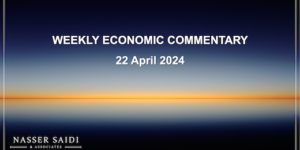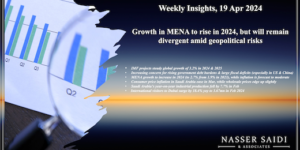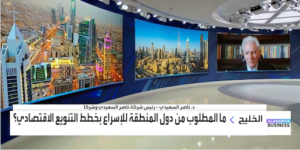Markets
Wall Street celebrated with new records the subdued US inflation figures and the lacklustre retail and consumer sentiment data which reduce the likelihood of further tightening by the Fed. In fact futures markets on Friday lowered the odds of another rate increase this year at less than 50% % and a rally in Treasury prices gained new strength. Other stock markets worldwide were pulled up by the US indices and regional markets joined the party as well. In currency markets, the USD suffered a major setback with the dollar index, which measures the greenback against a weighted average of currencies, fell to its lowest level since Sep. Even beleaguered currencies such as the GBP and the JPY, not to mention most emerging markets currencies, strengthened vis-à-vis the greenback. Oil prices rose in each of the 5 past trading days with Brent within striking distance of USD 50/b after US inventory numbers displayed a large drawdown. Gold closed at its highest in two weeks.
Global Developments
US/Americas:
- The US economy is expected to continue its expansion at a moderate pace although uncertainty persists about inflation pressures and fiscal policies, according to a prepared testimony to Congress by Fed’s President Yellen. She also stressed in “strongest possible terms” that the current spending by the US government is unsustainable and could harm productivity.
- US inflation was flat mom (1.6% yoy) in Jun due to a drop in energy prices (-1.6% mom after -2.7% mom in May) compared to a -0.1% mom (1.7% yoy) in May. Core CPI rose by a modest 0.1% mom (1.7% yoy) for the third consecutive month.
- US industrial production rose4% mom in Jun vs 0.1% in May (the fifth consecutive month of expansion). Manufacturing rose 0.2%, but utilities output remained flat. Capacity utilization crawled up by 0.2%.
- The US Fed’s Beige Book, covering mid-May through June, suggests that economic activity expanded at a slight to moderate pace across districts. Consumer spending increased in most districts, thanks to non-auto retail and tourism. Manufacturing, nonfinancial services and loan demand were perky in most districts. Construction ranged from flat to growing. The energy, sector, especially oil and natural gas, was broadly on the rise.
- US wholesale inventories in May gained4% mom exactly offsetting the drop in Apr. Durable goods advanced 0.6% mom, while nondurable goods were flat.
- US initial claims for unemployment insurance fell 3,000 to 247,000. The 4-week moving average rose by 2,250 from 245,750. Continuing claims dropped by 20,000.
- US retail sales fell in June -0.2% mom (2.8% yoy) worse than the -0.1% in May, mostly as a result of a drop in gasoline station sales. Excluding fuel sales were down -0.1% mom.
- The University of Michigan Consumer sentiment index in Jul lost 2 points to 93.1 due to somber consumer expectations. Both near- and long-term inflation expectations increased.
- The Bank of Canada as expected hiked its benchmark overnight interest rate by 25 bp to 0.75% after a long period of inaction.
Europe:
- The Eurozone industrial production shot up by 1.3% mom in May vs 0.3% in Apr. Capital goods production was the main driver with a 2.3% mom surge. Figures for certain countries such as France, Spain, Germany and Ireland were in record territory.
- The Eurozone’s trade surplus expanded strongly in May to EUR 21.4 bn vs EUR 16.8 bn in Apr.
- Germany’s inflation accelerated to 1.8% yoy in Jun from 1.6% in May.
- Germany’s trade surplus crawled up to EUR 20.3bn in May from EUR 19.8bn in Apr, but below the EUR 21.6bn in May 2016.
- UK unemployment fell to 4.5% in the three months to May, a record low since data collection began in 1975. However wages growth declined to 1.8% yoy vs 2.1% in the three months to Apr.
Asia Pacific:
- China’s M2 money supply grew4% in Jun vs 9.6% in May, due mainly to deleveraging in off-balance sheet items. Bank lending, especially mortgages, rose again, even though the limit to real estate credit in Tier 1 cities is taking a toll. The central bank kept its rates steady at 2.5%.
- China’s trade surplus fell to USD 42.8bn in Jun from USD 45.2bn a year earlier, but was up from USD 40bn in May, confirming the uptick in economic activity.
- Japan’s industrial activity index fell 1% mom in May, after a 1.1% rise in Apr, in part thanks to a lift in fuel prices.
- Singapore’s GDP grew by 2.5% yoy in Q2, the same rate as in Q1, which underscores a mildly positive situation in East Asia.
- The Bank of Korea left its base rate steady for the 13th straight meeting at a record low of 1.25% in Jul.
- India’s inflation plunged to 1.54 % yoy in Jun from 2.2% in May. The decline was broad-based, but food prices, which account for almost half of the basket, contributed most after a favorable monsoon season. Low food prices had an impact also on wholesale inflation which was 0.9% yoy in Jun.
- India’s industrial production rose7% yoy in May down from 3.1% in Apr, a disappointing performance for an emerging country which should be expanding at a much faster pace.
- Philippines’ trade deficit increased to USD 2.75bn in May from USD 2.24bn a year earlier.
Bottom line: Last week data releases did not reserve any major surprises, however, in the first half of 2017 data from the US have tended to disappoint when compared with the expectations raised after Trump’s election. In this regard it is remarkable that US equities do not trim the gains recorded since Nov and actually defy gravity in response to expectations of a dovish Fed’s policy. Such counterintuitive movements in stock market are a sign of financial fragility spurred by short-term strategies.
Regional Developments
- The Qatar diplomatic row continues: the US secretary of State left last week after multiple discussions on the crisis during a tour of the Gulf nations. During his visit, a US-Qatar accord on terrorism financing was signed in an effort to help ease the crisis. The UAE minister of state for foreign affairs tweeted that the countries were “headed for a long estrangement”.
- Bahrain’s Council of Representatives approved a unified family draft law that aims to improve the legal status of women. The bill is composed of 141 articles and governs personal status and family matters such as marriage, divorce and custody and covers the rights of men and women from both the Sunni and Shiite sects.
- The IMF approved last week Egypt’s second loan payment of USD 1.25bn. The managing director of the IMF praised the government and central bank for “taking the right measures to rein in inflation, reduce budget deficit”.
- Inflation in Egypt edged up slightly to 29.8% in Jun (May: 29.7%) and core inflation grew to 31.95% (May: 30.57%). Separately, Egypt’s deputy finance minister disclosed that the recent hike in interest rates was only a temporary measure, to target inflation. Furthermore, he stated that once prices begin to decline in early 2018, the rates would be reduced.
- FDI into Egypt rose by 12% To USD 6.6bn in the first nine months of the 2016-17 fiscal year, according to the investment ministry.
- Foreign holdings of Egypt’s government securities touched EGP 7.9bn as of Jul 13, according to the head of public debt at the ministry of finance.
- Saudi has invested around SAR 1bn worth in about 17 projects in Egypt’s tourism sector, according to the country’s tourism minister.
- Egypt plans to double the price of metro tickets in 2018, revealed the transport minister. Separately, Egypt signed a USD 4bn deal to build a new metro line, which is expected to accommodate around half a million passengers. The deal, signed with a Canadian plane and train manufacturer, stipulates that at least 40% of the materials used must be produced in Egypt.
- US pledged an additional USD 119mn for humanitarian aid in Iraq.
- Inflation in Jordan increased to 3.7% in H1 this year, led by transportation (14.3%), vegetables, dried and canned legumes (14.2%), tobacco and cigarettes (9.2%), culture and entertainment (9.6%), and rents (2%).
- Remittances of Jordanian expats grew by 1.5% to USD 1.5bn at end-May, according to the central bank.
- Jordan ranks 4th regionally and 35th internationally in terms of the risk of money laundering and terrorist financing, as per the 2016 Basel Anti-Money Laundering Index. Jordan is categorised as a medium-risk country, with a score of 4.88, and ahead of it in the list (in terms of risk) are Malta, Tunisia and Egypt.
- Unemployment in Jordan stood at 18.2% in Q1 this year (Q4 2016: 15.8%), with women unemployment rising by 8.2 points to 33%. In 2016, only 13.2% of women were economically active (seeking work, whether employed or unemployed), compared with 58.7% of men.
- Kuwait’s ministry of finance has prepared a draft bill for the implementation of selective excise taxes on tobacco, energy and soft drinks, reported the Al-Qabas The activities subject to taxes will be: exporting the commodities, domestic manufacturing of the commodities and importing these from any other GCC nation.
- Kuwait is planning to invest USD 8bn in petrochemical projects over the next five years, across Bahrain and other countries like the US, Canada and South Korea.
- Lebanon’s economy minister called for the drafting of a long-term “clear economic strategy” which could be implemented by all successive governments in the future, to revive and support economic growth. Separately, in an interview, he urged the Parliament to approve the competition law soon in a bid to end monopolies and allow new companies to enter to create competition.
- Lebanon’s finance minister remains optimistic that the Parliament would finally pass the long-awaited salary hike bill for the public sector this week. The bill is estimated to cost around USD 800mn annually (excluding payments to retired employees), adding to Lebanon’s high budget deficit and debt levels.
- Electricity subsidies in Oman are projected to decline by 10.6% yoy to OMR 456.3mn in 2017, according to data by the regulatory authority.
- Qatar’s inflation rate increased7% mom and 0.8% yoy in Jun (May: 0.1% yoy). Given the impact of the diplomatic row on the closure of Qatar’s land border, food prices spiked by 2.4% yoy and 2.5% mom in Jun, versus a decline of 1.9% yoy in May. However, the impact has been substantially lower given the price caps during Ramadan and also since the government absorbed the rising shipping costs.
- Qatar’s central bank governor disclosed that the country has USD 340bn in international reserves, including its sovereign wealth fund holdings.
- Qatar revealed that its exports, including of LNG, to Japan, India, South Korea and China had not been affected by the boycott. A representative for Shell also stated that (with relation to Qatar) “LNG flows remain stable, cargoes are going into the market”.
- UK’s Financial Conduct Authority has proposed a new “premium” stock market listing category for companies controlled by sovereign states, in a bid to attract the Aramco IPO Under these new requirements, the sovereign companies will not need to comply with certain rules on related party transactions and controlling shareholders.
- Saudi Arabia’s Shoura council has approved the draft VAT law.
- On the sidelines of the G20 summit, Saudi Arabia’s finance minister disclosed that a local currency Sukuk will be issued this month.
- Saudi Arabia’s crude oil production increased to 10.07mn barrels per day (bpd) in Jun; this is only 12,000 bpd above its output target under the OPEC deal which is 10.058mn bpd.
- An industry source disclosed that crude exports from Saudi Arabia for Aug will fall to their lowest level this year at around 6.6 million barrels per day. Crude allocations to Asia for Aug will be reduced by about 200k bpd to 3.5mn bpd, while allocations to Europe will be down by around 70k bpd at 520k bpd.
- Saudi Arabia’s Public Transport Authority has invited international companies and the private sector to participate in PPPs related to the construction and operation of railway transport services; projects include the Riyadh-Dammam Railway, Land Bridge Project that is set to connect the Red Sea with Arabian Gulf, and Northern Railway.
- Healthcare in Saudi Arabia will remain free for its citizens, even after privatisation of the sector by 2020, assured the health ministry.
- According to a Thomson Reuters and ACCA VAT Readiness Survey (http://onesource.tax.thomsonreuters.com/VAT_Survey_Readiness_Report), only 11% of respondents understand the impact that VAT implementation will have on their business, whereas close to half (49%) stated that said they were waiting for the framework to be finalized before commencing their VAT impact assessments. Separately, an Indirect Tax Client Survey undertaken by Deloitte (https://www2.deloitte.com/xe/en/pages/tax/articles/vat-gcc-survey.html) found that 60% of the respondents feel very well-informed regarding reports of the introduction of VAT in the GCC while half the respondents believe that they will be ready for VAT by the start of next year.
- The GCC retail sector is forecast to grow at a CAGR of 4.6% to USD 313.2bn in 2021; food retail sales are likely to grow a CAGR of 3.5%, driven by the expanding consumer base and demand for health foods. (The report can be accessed via http://www.alpencapital.com/industry-reports.html#)
UAE Focus
- The Dubai Economy Tracker posted a score of 56.5 in Jun, up from May’s 7-month low of 55. Wholesale and retail was the best performing sector, supported by activity in Ramadan and Eid, followed by construction sector. However, the 12-month business confidence slowed to the weakest since Aug 2016.
- UAE’s Ministry of Finance confirmed that certain financial services, residential properties, bare land and local passenger transport will be exempt from value added tax, which will be launched from next year. VAT will be charged at zero percent in the following categories: exports of goods and services to outside the GCC; international transportation, and related supplies; supplies of certain sea, air and land means of transportation (such as aircraft and ships); certain investment grade precious metals (such as gold, silver, of 99% purity); supply of certain education services; supply of certain healthcare services. Fee-based financial services will be taxed, but margin-based products are expected to be exempt.
- UAE’s state-owned oil company Adnoc plans an IPO: not of its holding company, but minority stakes in some of its services businesses with “attractive investment and growth profiles”. Reuters reported (citing a source) that Adnoc’s distribution business (which manages petrol stations) is planned before end of this year.
- Dubai’s non-oil trade in Q1 was dominated by imports (AED 201bn), while exports and re-exports together clocked in AED 126bn. China remained the largest trading partner (AED 44.15bn or 13.5% of total), followed by India (AED 25.4bn, 7.8%) and US (AED 22bn, 6.7%). Trade with Saudi Arabia, at AED15.22bn or 4.7% of total trade, was the top GCC partner nation and the fourth biggest globally.
- The UAE plans to reduce the time required to issue residency permits for private sector employees by 50% within four years.
- UAE was one of the countries in the “stand out” section within the Digital Evolution Index 2017; along with New Zealand and Singapore, UAE was identified as the standouts even within the Stand Out segment given “a unique policy-led digital strategy and a narrative that could be considered as worthy of emulation or adoption”. (The executive summary can be accessed at: https://sites.tufts.edu/digitalplanet/executive-summary/)
- Emirates Airlines disclosed that it supported more than 104k jobs in the US while contributing USD 21.3bn in revenue to the US economy. Emirates US flights transported almost 580k new travelers, thereby generating USD 3.2bn of new trade-based revenue.
Media Review
Why Europe needs more migrants
https://www.economist.com/blogs/graphicdetail/2017/07/daily-chart-6
Qatar’s economic fundamentals seen weakening as sanctions bite
http://gulfnews.com/business/sectors/banking/qatar-s-economic-fundamentals-seen-weakening-as-sanctions-bite-1.2055293
100 years of debts
http://gonzaloraffoinfonews.blogspot.it/2017/07/one-hundred-years-of-indebtness-project.html
The Asian crisis, 20 years later
https://www.project-syndicate.org/commentary/asia-crisis-20-years-later-by-barry-eichengreen-2017-07
New equity market to foster growth among Bahraini SMEs
http://www.oxfordbusinessgroup.com/news/new-equity-market-foster-growth-among-bahraini-smes
The new abnormal in monetary policy
https://www.project-syndicate.org/commentary/unconventional-monetary-policy-new-normal-by-nouriel-roubini-2017-07
Powered by:







